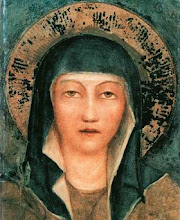Nun Opera!: Dialogues of the Carmelites

I really must apologize to St. Teresa of Avila and St. Therese....because I've noticed that I've ignored the dear Carmelites on this blog. Thus, I will make my first Carmelite-related post!
I received a flyer in the mail today that announced that next season, the Lyric Opera of Chicago will be performing Francis Poulenc's opera, Dialogues of the Carmelites. The opera is based on a screenplay written by George Bernanos, author of Diary of a Country Priest and one of the greatest Catholic authors of all time. Unfortunately, being that the Lyric Opera of Chicago tends to like very start settings, they will not be using habits for the performance. However, I know that other performances have definitely used habits.
If you haven't heard any of Poulenc's music, you MUST! It's a bit freaky/silly at first, but once you acquire a taste for it, it's some of the most beautiful music you've ever heard. His O Magnum Mysterium sends chills down my spine.
Below is a synopsis of the opera taken off of Wikipedia:
The action takes place during the French Revolution and subsequent Terror.
Act I.
The pathologically timid Blanche de la Force decides to retreat from the world and enter a Carmelite convent. The Mother Superior informs her that the Carmelite order is not a refuge: it is the duty of the nuns to guard the Order, not the other way around. In the convent, the jolly Sister Constance tells Blanche (to her consternation) that she has had a dream that the two of them will die young together. The Mother Superior, who is dying, commits Blanche to the care of Mother Marie. The Mother Superior passes away in great agony, shouting in her delirium that despite her long years of service to God, He has abandoned her. Blanche and Mother Marie, who witness her death, are shaken.
Act II.
Sister Constance remarks to Blanche that the Mother Superior's death seemed unworthy of her, and speculates that she had been given the wrong death, as one might be given the wrong coat in a cloakroom. Perhaps someone else will find death surprisingly easy. Perhaps we die not for ourselves alone, but for each other.
Blanche's brother, the Chevalier de la Force, arrives to announce that their father thinks Blanche should withdraw from the convent, since she is not safe there (being a member of both the nobility and the clergy). Blanche refuses, saying that she has found happiness in the Carmelite order, but later admits to Mother Marie that it is fear (or the fear of fear itself, as the Chevalier expresses it) that keeps her from leaving.
The chaplain announces that he has been forbidden to preach (presumably for being a non-juror under the Civil Constitution of the Clergy). The nuns remark on how fear now governs the country, and no one has the courage to stand up for the priests. Sister Constance asks, "Are there no men left to come to the aid of the country?" "When priests are lacking, martyrs are superabundant," replies the new Mother Superior. Mother Marie says that the Carmelites can save France by giving their lives, but the Mother Superior corrects her: it is not permitted to become a martyr voluntarily; martyrdom is a gift from God.
A police officer announces that the Legislative Assembly has nationalized the convent and its property, and the nuns must give up their habits. When Mother Marie acquiesces, the officer taunts her for being eager to dress like everyone else. She replies that the nuns will continue to serve, no matter how they are dressed. "The people has no need of servants," proclaims the officer haughtily. "No, but it has a great need for martyrs," responds Mother Marie. "In times like these, death is nothing," he says. "Life is nothing," she answers, "when it is so debased."
Act III.
In the absence of the new Mother Superior, Mother Marie proposes that the nuns take a vow of martyrdom. However, all must agree, or Mother Marie will not insist. A secret vote is held; there is one dissenting voice. Sister Constance declares that she was the dissenter, and that she has changed her mind, so the vow can proceed. Blanche runs away from the convent, and Mother Marie finds her in her father's library. Her father has been guillotined, and Blanche has been forced to serve her former servants.
The nuns are all arrested and condemned to death, but Mother Marie is away (with Blanche, presumably) at the time. The chaplain tells Mother Marie that since God has chosen to spare her, she cannot now voluntarily become a martyr by joining the others in prison. The nuns march to the scaffold, singing Salve regina. At the last minute, Blanche appears, to Constance's joy; but as she mounts the scaffold, Blanche changes the hymn to Deo patri sit gloria (All praise be thine, O risen Lord).









1 Comments:
i saw this (on video) when i was rather young. from what i remember, it's quite worth seeing.
Post a Comment
<< Home